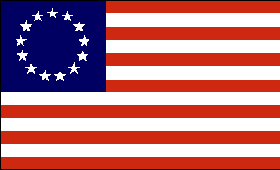Colonial Wars |
American Wars |
Link To This Page — Contact Us —
The Battle of Harlem Heights
September 16 , 1776 at Harlem, New York
 |
|||||||||||||||||||||
|
The Americans—under Generals George Washington, Nathanael Greene, and Israel Putnam, totaling around 2,000 men—held a series of high ground positions in upper Manhattan against an attacking British division totaling around 5,000 men under the command of General Alexander Leslie. British troops made what became a tactical error by sounding a fox hunt bugle call while in pursuit, meant to insult the Continentals, who were in orderly retreat. This instead infuriated the Americans who galvanized to hold their ground and rallied for victory (though the battle is taken as a draw).
On September 15, after the British landed at Kip's Bay, Gen. William Howe and his army advanced on the east side of Manhatten while the Americans advanced on the west side.
On September 16, Gen. George Washington was in considerable anxiety at the inability of his troops to stand up to the British and Germans of Gen. William Howe’s army. Step by step, the Americans were being driven off the Island of New York, now Manhattan. Washington now held only the northern plateau of the island, around the fortification of Fort Washington on the Hudson shore. He sent a party of New England Rangers under Capt. Thomas Knowlton to scout the British movements to the South of his position. He descended from the northern plateau into an area of lower ground known as the Hollow Way and on to the next plateau. There, his party of around 120 men encountered the British light infantry pickets and firing broke out. More British troops came up and the small party of Rangers was forced to retreat in some haste, with the British in pursuit.
It is said that the Americans on the northern plateau were particularly enraged to hear the British using derisive fox hunting calls. Washington ordered a force forward to lure the party of British further onto the plateau, while a second force moved around the British right flank and cut them off from the southern plateau and further reinforcement.
The British took the bait and moved further onto the northern plateau as the Americans fell back before them. As they moved south, the American flanking party encountered some British troops and firing broke out, warning the light infantry that they were in a perilous position.
The fighting ranged north before Washington decided to send troops forward in 2 flanking maneuvers, one under Maj. Leitch and the other under Knowlton. A third force of Americans made a feint to attack the British in their front.
One of Howe's subordinates made a critical mistake during the fight. A "fox horn" was sounded before the fight was over. A "Fox Horn" was used by fox hunters and signaled to other hunters that the fox had given up and was ready to be killed. The American force heard the horn and all this did was to motivate the men to fight even harder. Although the Americans attacked before the British were surrounded and Leitch and Knowlton were both mortally wounded, the British found themselves attacked on 3 sides and began their retreat. Under persistent attack, the British retreated to a field in the Hollow Way. The fighting continued for an hour until the imminent arrival of more British forces caused Washington to call his troops back.
The number of troops grew to nearly 5,000 on each side as the British were pushed back. Washington called off the attack after 6 hours because the Americans were not ready for a general engagement with the full British army.
The importance of this action for the Americans was that it was the Virginia militia who had fled the British the day before who fought steadily and effectively alongside the Northern Rangers, going a long way to restoring the confidence of the American army in itself. The British and Hessians suffered nearly 400 casualties—about 90 killed and 300 wounded. The Americans had only about 100 wounded and 30 killed, including among the dead Lieutenant Colonel Thomas Knowlton and Major Andrew Leitch
